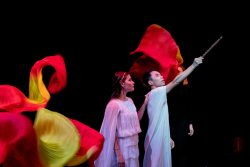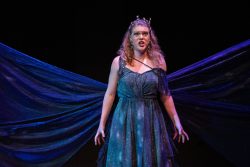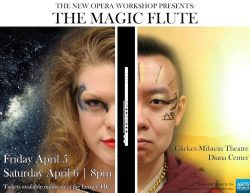Last night, Bwog staffers Levi Cohen (opera fan/groupie) and Betsy Ladyzhets (tree expert, opera newbie) went to the Glicker-Milstein Theatre for the opening night of NOW’s production of Mozart’s “Die Zauberflöte.” It was a rollicking evening of bird people, angry moms, and sun worship.
Let’s just come out and say it: Mozart’s Die Zauberflöte (1791), aka The Magic Flute, is a weird beast of an opera (or, more precisely, a Singspiel: that is, the singing bits are strung together by dialogue). You’ve got your typical tenor-soprano pair of lovers who fall in love in a single duet, Tamino (Carl Lian GSAS ‘20) and Pamina (Sarah Fleiss CC/Julliard ‘21), but other operas don’t feature them going through a mythical Temple of Ordeals to conquer Masonic trials of fire and water via a magical musical instrument. You’ve got your right-hand bass, Papageno (Connor Ouly Juilliard ‘21), but he’s not usually dressed up and acting like a bird. You’ve got the show-stopping soprano aria, sung here by the Queen of the Night (Jessica Edgar CC ‘19), but the content being a mother commanding her daughter to murder her sworn enemy on pain of being disowned is… atypical. It’s a perennial favorite either because or in spite of its ridiculousness, and this production by the CU New Opera Workshop cut to the heart of the show with a cast that gave uniformly great vocal performances.
This Magic Flute, produced by Julian Vleeschhouwer CC ‘19, chose to keep all the sung passages in German but to translate the dialogue into English. This was, overall, a smart move, helping to promote audience understanding of the convoluted plot. Altering the connective tissue and not the vital organs, as it were.
The biggest joy of the evening was Sarah Fleiss’ turn as Pamina, whose voice was nothing short of revelatory. Fleiss was in complete command for the whole show, nailing forte high notes like it was nothing and sustaining energy through every pianissimo. Her acting was also very good, aside from a flubbed line or two; she played up the comedy of Pamina and managed to make a potentially boring character very engaging indeed. Carl Lian as Tamino made the most of his straight-man role, being especially enjoyable in his Act I aria “Dies Bildnis ist bezaubernd schön” and in group numbers. Connor Ouly, our Papageno, had the best German of the bunch, and committed fully to the comedy without sacrificing a strong vocal showing.
Jessica Edgar as the Queen of the Night was absolutely brilliant, with an extremely powerful voice that didn’t lose steam even at the upper end of her tessitura. For a young singer with a young instrument, she pulled off the insane coloratura in the Act II rage aria “Der Hölle Rache kocht in meinem Herzen” with aplomb. Her graduation this spring is a loss for CUNOW, but this role was certainly the best way to go out.
The three ladies and attendants to the Queen of the Night (Gabrielle Ferrari GSAS ‘22, Cleome Barber BC ‘20, and Emily Young BC ‘22) were at turns ethereal and very funny. Ferrari in particular commanded attention with her voice, and every time she swished onstage in her gown I was happy to see her. Madeleine Collier (BC ‘19) made the most of the small role of Papagena, matching Ouly’s comedic energy in their duet “Pa… pa… pa…”. You’ll laugh, you’ll cry (well, maybe not), and you’ll root for these crazy birds to start having kids already. Mike He (MSPH ‘20) was great as the high priest Sarastro, with an almost unbelievably resonant bass voice that made my bones rattle in a good way.
The orchestra, conducted by Joseph Morag CC ‘18, was in fine form throughout, with the string section (Caroline Marris GSAS ‘19 and Emily Kimura BC ‘20 on violin, Ada Naiman BC ‘20 on viola, and Brian Kuo CC ‘22 on cello) particularly on top of it. It was clear, unfortunately, that the brass section was holding back due to the smallness of the space. Special commendation also has to go to Megan Trach BC ‘20 on flute and Clara Dolfen GSAS ‘21 on piccolo, whose instruments play an actual role within the plot of the opera, as the titular flute and Papageno’s pipes, respectively. Trach has an extended solo in the second act, becoming essentially a character in the scene, and she pulled it off excellently.
The costumes by Becca Li (SVA ‘20) were wonderful— the Queen of the Night’s dress, complete with dramatic train, was a standout, as were the outfits worn by the chorus (complete with LEDs that made the audience gasp!). Props (managed by Haoqi Xia CC ‘20, who also sang as a countertenor in the production) were very fun: a serpent made of paper lanterns, fabric fans to signify water and fire, a glittering dagger.
With all that said, it’s unfortunate that the staging was rather weak. Set changes took a long time and were unaccompanied by music, so we sat in darkness and silence for sometimes up to a minute. Chairs, couches, and gateway arches came and went without much effect. The only constant pieces of set were two very ugly abstract “trees” that did almost nothing except get in the way of the actors. The production would genuinely have been better without any set pieces at all; they hindered the flow of the evening and were generally a bother.
But at the end of the day, all sins of the production can be forgiven by a good cast, and that’s what we had here. I said it in my last review of a CUNOW evening: the best thing about going to see and support student musicians is watching, potentially, the future of an artform. Tickets for tonight’s performance at 8:00 are sold out, but I would recommend showing up to see if you can get in on a waitlist. A little bird told me it’d be worth it.
- Sarah Fleiss, CC’21, and Carl Lian, GSAS’20, as Pamina and Tamino in a scene from Act 2 of the opera
- Jessica Edgar, CC’19, as the Queen of the Night in a scene from Act 2 of the opera
- Men are from Mars…
Gallery via Tristan van Biema, CC’17.


 0 Comments
0 Comments


